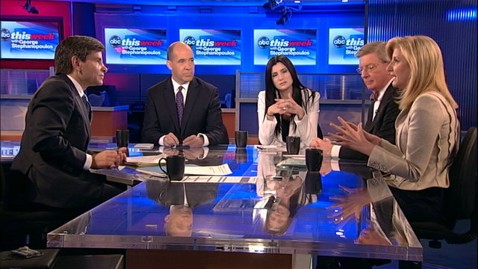Matthew Dowd: Susan G. Komen-Planned Parenthood Debate Shows 'Poisonous Part of Democracy'

ABC
ABC News political analyst Matthew Dowd said that the debate this week over funding between the Susan G. Komen Foundation and Planned Parenthood shows the "corrupt nature that's happened in politics" is now impacting private groups.
"This is a corrupt, poisonous part of democracy at work," Dowd said on the "This Week" roundtable of the backlash this week when the Susan G. Komen Foundation announced it was removing funding for mammogram screenings from Planned Parenthood - before reversing course after a vocal outcry.
"A private foundation can give and dispense money any way it wants," Dowd added. "I think foundations should be able to make a decision, and if Planned Parenthood wants to go out and raise the money" they lost from the Komen Foundation, they can do so.
AOL Huffington Post Media president Arianna Huffington said the debate showed "social media at work" as supporters of Planned Parenthood galvanized support online.
"This was about women's health. This was an attempt to politicize it," Huffington said. "So the attempt to politicize this issue backfired, and people said this is not a left-right issue."
George Will disputed that idea, saying "This is not about women's health. This is about providing 300,000 abortions a year. Planned Parenthood cleverly cast this to say we are in the mammogram business. They're not in the mammogram business."
"All these people describing themselves as pro-choice said it is illegitimate to choose not to be involved in abortion," Will added.
Will said the Obama administration's requirement for Catholic hospitals and other institutions to provide insurance policies that cover contraception services was a greater threat.
Catholic churches protested that requirement at Sunday services last week, reading letters written by church leaders saying the policy infringed on religious freedom.
"On the political side, in Pennsylvania, Michigan, Ohio, particularly, there are lots of blue-collar Catholics who hear this as more bullying," Will said.
Dowd, who serves on the board of a Catholic hospital in Austin, Texas, agreed that it was an issue of government overreach.
"I think people that run these institutions and are in these services think…why is the federal government doing this, when we're providing all this care," Dowd said. "Why is big government getting involved in our business, which we know what to do?"
"It's a stunning display of irony when you look at all of this," added conservative radio host Dana Loesch. "For instance, Komen is excoriated over their choice - the private charity to do what they want with their money. And here you have the government now saying that you don't have a choice to be able to practice your religious liberty and these institutions have to comply with this particular mandate that goes against their freedom and liberty."
But Huffington said it was about making contraception available to those who work at Catholic institutions, including non-Catholics who do not oppose contraception.
"The churches are not going to be affected," Huffington said. "We're talking about Catholic hospitals that employ a lot of non-Catholics."